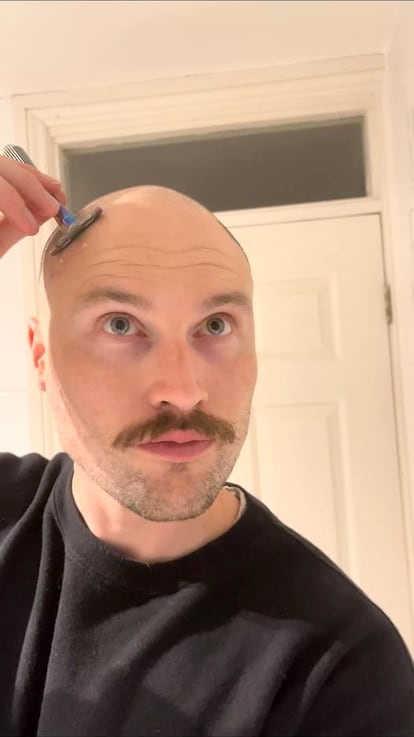Harry James, the influencer who advocates for bald pride
The creator of Bald Cafe proposes embracing male pattern baldness, instead of hiding it

Harry James was 25 years old when he first noticed a bald spot. He saw it in the mirror, and his first reaction was to just ignore it. It was not long before the hair loss became evident, and with it came the crisis. He started sitting at the back of the classroom so nobody would see him, avoided making eye contact with the girls and isolated himself from the world. He was ashamed. Today, however, he is 32 and hundreds of thousands of people follow his Instagram and YouTube channel, Bald Cafe, to see his advice on dealing with baldness. Not to hide it, but to accept it with dignity. He is but one example of a new generation of influencers who want to prove that a man does not need a single hair on his head to be attractive and confident.
If you search for keywords related to male pattern baldness on Instagram, YouTube or TikTok, most of the results will have to do with learning to counteract or stop hair loss. Content creators like Harry are a niche — but one that is gaining presence with their aesthetic routines, tutorials and photos where they flaunt their heads. “Facing baldness without hiding allows you to see that you really can handle it, that you don’t need to be afraid,” says Harry via video call.
A recent study by the World Population Review shows that the two countries with the highest percentage of bald men are the Czech Republic and Spain. In the US, according to research from the National Institute of Health, approximately 16% of men between 18 and 29 years old, and 53% of those between 30 and 49, experience some degree of hair loss. Many figures from popular culture proudly sport a fully shaved head, from actors like Dwayne Johnson (The Rock) to personalities like Prince William.
On Bald Cafe’s YouTube channel (218,000 subscribers), as well as on the profiles of other bald influencers like Zeph Sanders (151,000 followers on Instagram), there are thousands of comments from men who express their gratitude for seeing the stigma surrounding androgenetic alopecia being broken. According to a post on the specialized website Medical News Today, this condition is associated with psychological conditions such as anxiety, anger, depression, shame, decreased confidence, reduced work and sexual performance and even suicidal tendencies.
“Realization is a creeping process of denial eroded by moments of shock and, later, resignation. Denial was believing that what wasn’t in the mirror (namely a birds-eye view of my head) didn’t exist. Shock was encountering a photo of myself, taken from above, and wondering, ‘Who’s that balding guy standing exactly where I was?’” writes journalist Oscar Holland in an article for CNN.
Since he launched the Bald Cafe project, James started receiving messages from guys who felt tormented by their baldness and wanted someone to talk to. “Many wondered what they had done wrong, when we already know that this is purely genetic,” explains the influencer. Others simply listened to Harry’s experience and shared their own. Now, a significant part of his channel is devoted to sharing these stories of men who, like him, overcame the crisis and embraced their baldness. “Some may spend decades hiding from the world, behind a hat. My goal is simply to do everything possible to help pull men out of their hiding place, where they restrict themselves and don’t reach their true potential out of fear and anxiety about hair loss,” concludes James.
Sign up for our weekly newsletter to get more English-language news coverage from EL PAÍS USA Edition
Tu suscripción se está usando en otro dispositivo
¿Quieres añadir otro usuario a tu suscripción?
Si continúas leyendo en este dispositivo, no se podrá leer en el otro.
FlechaTu suscripción se está usando en otro dispositivo y solo puedes acceder a EL PAÍS desde un dispositivo a la vez.
Si quieres compartir tu cuenta, cambia tu suscripción a la modalidad Premium, así podrás añadir otro usuario. Cada uno accederá con su propia cuenta de email, lo que os permitirá personalizar vuestra experiencia en EL PAÍS.
¿Tienes una suscripción de empresa? Accede aquí para contratar más cuentas.
En el caso de no saber quién está usando tu cuenta, te recomendamos cambiar tu contraseña aquí.
Si decides continuar compartiendo tu cuenta, este mensaje se mostrará en tu dispositivo y en el de la otra persona que está usando tu cuenta de forma indefinida, afectando a tu experiencia de lectura. Puedes consultar aquí los términos y condiciones de la suscripción digital.









































